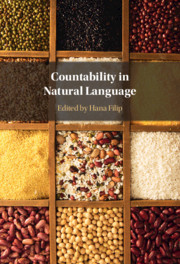Refine search
Actions for selected content:
3 results
6 - Iceberg Semantics for Count Nouns and Mass Nouns: How Mass Counts
-
-
- Book:
- Countability in Natural Language
- Published online:
- 11 June 2021
- Print publication:
- 01 July 2021, pp 161-198
-
- Chapter
- Export citation

Countability in Natural Language
-
- Published online:
- 11 June 2021
- Print publication:
- 01 July 2021
13 - Overlap and Countability in Exoskeletal Syntax: A Best-of-Both-Worlds Approach to the Count–Mass Distinction
- from Compositional Analyses and Theoretical Issues
-
-
- Book:
- Things and Stuff
- Published online:
- 21 May 2021
- Print publication:
- 10 June 2021, pp 305-318
-
- Chapter
- Export citation
